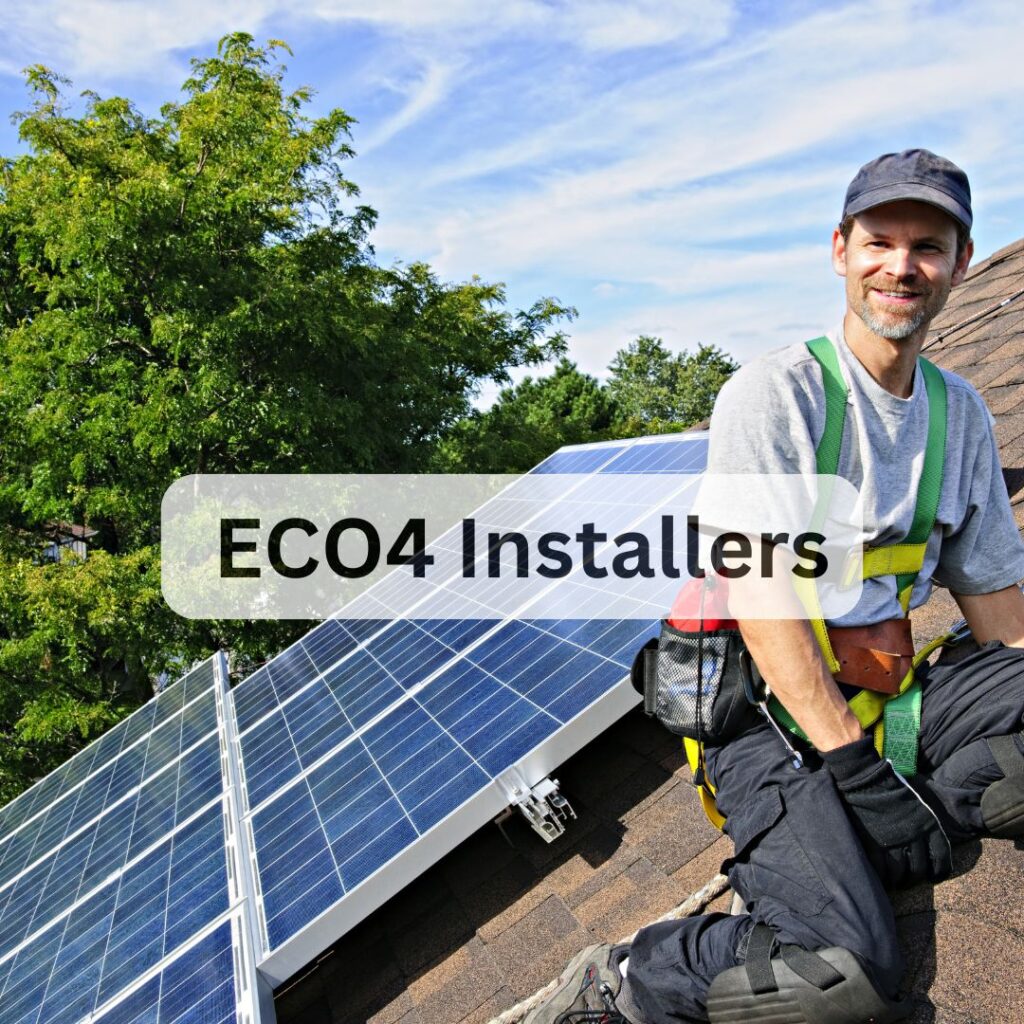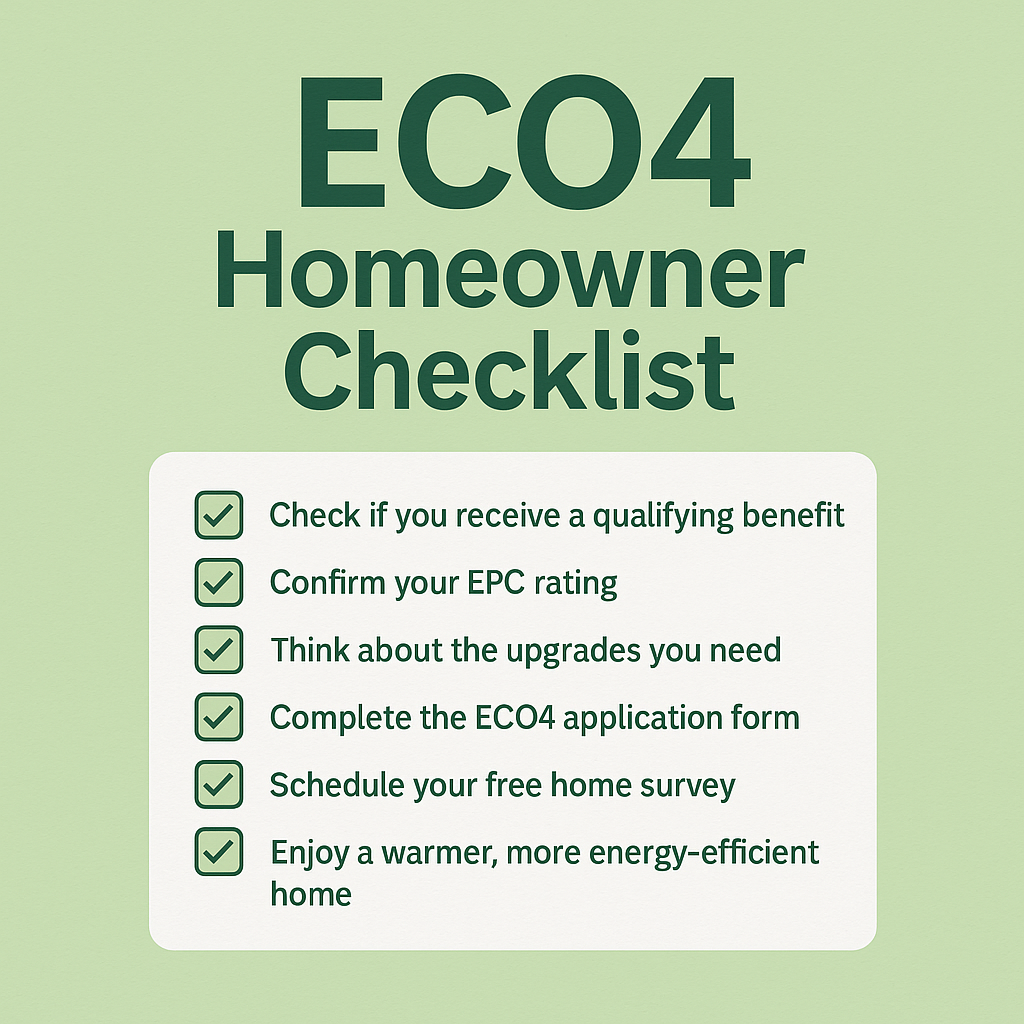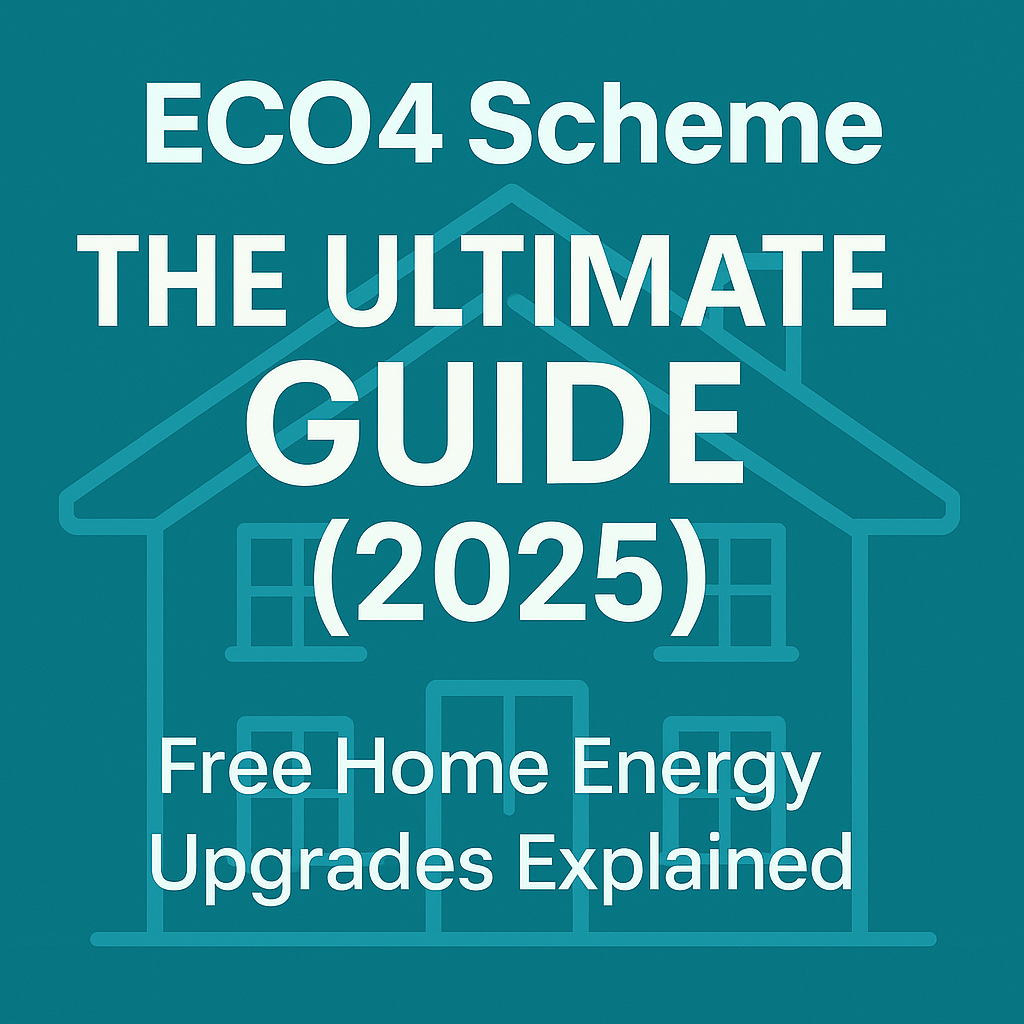When it comes to making UK homes more energy efficient and tackling fuel poverty, the ECO4 scheme stands out as a crucial initiative. Supported by the government, this program seeks to enhance energy efficiency through a variety of measures including insulation, solar PV installations, and replacement boilers. The importance of fully qualified and certified installers under ECO4 cannot be overstated; they ensure that all work adheres to high standards and regulatory compliance.

For those eligible, the benefits of the ECO4 scheme are significant. Vulnerable consumers can access much-needed energy efficiency improvements through installers who are not only PAS2030 and TrustMark certified but also work with obligated suppliers. This guarantees that projects meet specific standards with proper documentation and verification processes in place, which is crucial for both compliance and quality assurance.
As leading agents in the ECO4 scheme, we allocate funding to a wide range of energy efficiency measures. This makes it easier for homeowners and landlords to implement upgrades without financial strain. Learning about the scheme’s benefits and how to apply is essential for anyone looking to make their property more energy efficient and reduce fuel costs.
Key Takeaways
- ECO4 focuses on making homes more energy efficient and reducing fuel poverty.
- Qualified and certified installers ensure high standards and compliance.
- Funding available for various energy efficiency measures.
Understanding the ECO4 Scheme
The ECO4 Scheme is an important government initiative aimed at increasing energy efficiency and reducing fuel poverty in lower-income households. This scheme is regulated by Ofgem and is a continuation of previous ECO phases with updated measures and eligibility criteria.
Overview of ECO4
The ECO4 Scheme, or Energy Company Obligation phase 4, is designed to help improve the energy efficiency of homes in the UK, particularly for vulnerable groups. It focuses on various energy-saving measures such as insulation, heating systems, and renewable energy installations. ECO4 is not just a continuation but an enhancement in terms of funding and scope, aiming to provide more comprehensive support to households that need it the most.
Evolution From ECO3 to ECO4
ECO4 builds upon the foundation laid by ECO3 with several key changes. Under ECO3, the focus was narrower, primarily targeting basic insulation and heating improvements. In contrast, ECO4 expands its reach to more advanced measures, including renewable energy solutions. This evolution responds to the changing needs of energy efficiency and the increasing urgency of tackling fuel poverty. Also, the funding levels have been enhanced to cover a broader spectrum of upgrades, making it easier for households to access necessary improvements.
Role of Ofgem
Ofgem plays a crucial role in the implementation and regulation of the ECO4 Scheme. As the regulatory authority, Ofgem oversees the compliance and effectiveness of the scheme. It ensures that the required standards are maintained and that the obligated energy companies fulfill their responsibilities. Ofgem also provides detailed guidance and resources to installers, ensuring that they meet the necessary compliance requirements. This transparency and regulation boost the confidence of consumers and stakeholders in the scheme’s integrity.
Qualifying Criteria for ECO4
To be eligible for ECO4, several specific criteria must be met, focusing primarily on household income levels, receipt of certain benefits, and housing types. The following subtopics will provide an in-depth look at these requirements.
Eligibility Requirements
Eligibility for ECO4 hinges on meeting defined criteria set by Ofgem. Installers must ensure that the households they service meet these benchmarks. Primarily, the household should be in receipt of one or more qualifying benefits.
Moreover, the property itself must support improvements, such as insulation or heating upgrades, to meet ECO4 standards.
- TrustMark registered status is mandatory for installers.
- Contacting obligated suppliers is essential for compliance.
Ensuring these elements align guarantees smoother project approval and successful funding applications.
Target Demographics
ECO4 aims to support low-income households and those in social housing. These groups are identified for their higher risk of fuel poverty, making them priority recipients.
- Low-income households often struggle with energy bills, making energy efficiency crucial.
- Social housing tenants are also targeted, as these properties frequently lack modern insulation and efficient heating systems.
By focusing on these demographics, ECO4 ensures that the benefits reach those most in need, reducing energy poverty and improving living conditions.
Income Support and Benefits
The specific benefits required to qualify for ECO4 include a range of income-related supports. Key benefits include Income Support (IS), Working Tax Credit (WTC), Universal Credit (UC), and Housing Benefit.
These benefits indicate that the household may struggle with energy costs, justifying the need for assistance.
- Income Support (IS) helps low-income individuals.
- Working Tax Credit (WTC) is for low-earners.
- Universal Credit (UC) combines several benefits, helping those with limited income.
- Housing Benefit provides rent assistance.
By focusing on these benefits, ECO4 ensures that aid goes to those who need it most, promoting energy efficiency and financial relief.
The Role of ECO4 Installers
ECO4 Installers play a crucial part in the government’s Energy Company Obligation scheme. They ensure low-income households receive essential energy-saving improvements, carry out installations with high compliance standards, and maintain certifications to guarantee quality.
Responsibilities and Duties
ECO4 Installers must deliver high-quality energy-saving measures while adhering to regulatory requirements. Key responsibilities include conducting energy assessments, recommending suitable improvements, and ensuring proper installation of insulation, heating systems, and renewable energy solutions.
They must also adhere to client specifications and project timelines, ensuring work is completed efficiently. Installers work closely with managing agents to monitor project progress and maintain thorough documentation for compliance reporting.
Criteria for ECO Installers
To participate in the ECO4 Scheme, installers must meet specific criteria. First, they must be registered with TrustMark, which ensures adherence to government-endorsed quality standards and robust customer protections. Installers need to be familiar with PAS2030, the standard for retrofitting energy efficiency measures.
Additionally, installers must demonstrate experience and reliability in working with low-income households. Those new to ECO schemes should seek accreditation through recognised bodies to meet the required standards quickly.
TrustMark and MCS Certification
TrustMark certification is mandatory for all ECO4 Installers. It serves as an assurance of quality and compliance with UK standards. TrustMark ensures installers are evaluated for competency, good trading practices, and customer service.
For those installing renewable energy systems, MCS (Microgeneration Certification Scheme) certification is also required. MCS certification covers product and installer standards for technologies like solar panels and heat pumps. Combining TrustMark and MCS certifications, installation companies offer comprehensive, reliable services under the ECO4 initiative.
Available Energy Efficiency Measures
In implementing ECO4, we provide several energy efficiency measures, focusing on insulation, heating system improvements, and renewable energy options. These measures aim to enhance energy savings and reduce carbon emissions in homes.
Insulation Solutions
Proper insulation significantly boosts the energy efficiency of a home. We offer a range of insulation options, including loft insulation, cavity wall insulation, and solid wall insulation. Each type addresses specific areas of heat loss in a building.
- Loft Insulation: Adds a thermal barrier in the roof, preventing heat from escaping.
- Cavity Wall Insulation: Fills the gaps between walls, reducing heat loss through walls.
- Solid Wall Insulation: Ideal for older homes with solid walls, providing exterior or interior insulating layers.
These solutions not only lower energy bills but also contribute to a more comfortable living environment by maintaining consistent indoor temperatures.
Heating Systems
Upgrading heating systems is crucial for enhancing a home’s energy efficiency. We focus on installing energy-efficient boilers, smart heating controls, and heat pumps.
- Energy-Efficient Boilers: These modern boilers are designed to use less fuel and produce lower emissions.
- Smart Heating Controls: Include programmable thermostats and zoned heating, allowing precise control over heating, leading to energy savings.
- Heat Pumps: Transfer heat from the ground or air to provide efficient home heating.
These improvements ensure more efficient heating, reduce fuel consumption, and can significantly cut down on energy costs.
Renewable Energy Options
Integrating renewable energy sources is a forward-thinking approach to energy efficiency. We offer solutions such as solar panels and biomass heating systems.
- Solar Panels: Convert sunlight into electricity, helping to reduce reliance on fossil fuels.
- Biomass Heating Systems: Use organic materials like wood pellets for heating, which are more sustainable compared to conventional fuels.
These renewable options not only help in reducing the carbon footprint of homes but also promote long-term energy sustainability by harnessing natural resources.
Funding and Finance
The ECO4 scheme provides significant financial incentives for installers dedicated to improving energy efficiency in lower income households. We will cover how these funds are allocated and the specific payment terms that installers need to adhere to.
Understanding ECO4 Funding
ECO4 Funding is designed to assist installers in delivering energy efficiency improvements in homes. This funding is facilitated by Ofgem and managed by leading agents like Anesco. Installers can access funds for measures such as insulation, replacement boilers, and renewable energy solutions.
The funds are meant to directly support vulnerable consumer groups, ensuring that low-income households can benefit from improved energy efficiency. It is essential for installers to be TrustMark registered businesses to be eligible for these funds. Compliance with government rules is crucial, including the prohibition of blending ECO4 funds with other government grants.
Payment Terms for Installers
Installers participating in the ECO4 scheme must adhere to specific payment terms to ensure financial compliance and the smooth operation of the funding process. Payments are typically structured based on the completion and verification of the installed measures.
This means that after an installer completes a project, they must await verification before receiving funds. Generally, this ensures transparency and accountability. It is advised to maintain detailed records of installations and compliance requirements to avoid delays.
Furthermore, teaming up with managing agents such as Anesco can streamline the payment process, as these agents often handle the bulk of administrative tasks. This partnership allows installers to focus more on delivering high-quality improvements while the agents manage the financial and compliance aspects.
Compliance and Standards
ECO4 installers must adhere to stringent standards to ensure regulatory compliance and effective energy efficiency improvements. Key focuses include obtaining the necessary PAS2030 certifications and ensuring thorough auditing and documentation.
PAS2030 and PAS2030:2035
To participate in ECO4, installers need to be certified under the PAS2030 standard, specifically the PAS2030:2035. This certification proves that installers meet the required standards for installing energy efficiency measures. It focuses on both the workmanship and the quality of the materials used.
PAS2030 lays down the standards for the processes involved in the installation of energy efficiency measures. PAS2030:2035 extends this by specifying the requirements for initial assessments, installation processes, and the post-installation evaluation.
Certification requires a comprehensive assessment from a legitimate body, like the British Assessment Bureau. This process ensures that installations are effective and sustainable. Only TrustMark registered businesses qualify, reducing risks associated with substandard work.
Regulatory Compliance and Auditing
Regulatory compliance begins with adhering to guidelines set by authorities such as Ofgem. Installers must document all processes meticulously, including photographs, receipts, and technical data sheets, to demonstrate that their work meets ECO4 standards.
Regular audits are conducted to verify compliance. These audits not only assess the quality of the completed work but also review the documentation provided. The ECO4 Delivery Guidance outlines how installers and suppliers can meet obligations, ensuring a stable and efficient supply chain.
Compliance certificates, such as the Building Regulations Compliance Certificate, are essential post-installation. These are typically received within 10-15 working days after the project completion, ensuring that both the installer and the homeowner retain proper records for future reference.
The Application Process
To apply for the ECO4 scheme, installers must follow a structured process that ensures compliance and helps in the swift assessment and approval of the application. This involves completing an application form, submitting necessary paperwork, and adhering to specific compliance requirements.
Completing the Application Form
The first step involves filling out the application form comprehensively. Installers need to provide detailed information about their company, including TrustMark registration details.
Additional fields include personal contact information, business address, and relevant qualifications.
We recommend double-checking all information for accuracy.
Most forms are available online, but some providers may offer downloadable PDF versions. Once completed, the form must be signed and dated by an authorised representative of the company. Inaccurate or incomplete forms can lead to delays in processing. It’s crucial to prepare any supplementary documentation, such as proof of qualifications or previous work references, to include with the application.
Submission and Documentation
After completing the application form, the next step is submission. This can usually be done either via email or through an online portal provided by the respective ECO4 scheme administrators.
Ensure that all required documents are prepared and attached. Commonly requested documents include proof of TrustMark registration, business licences, and qualifications.
It’s also important to include any other specific paperwork requested by the scheme.
Once submitted, the application and documents will be reviewed for compliance. The assessment process often involves verifying the authenticity and accuracy of the documents provided. Any additional documents or clarifications needed will usually be requested via email or a phone call. Keeping a copy of all submitted paperwork is advisable for future reference and potential follow-up.
Impact and Benefits of ECO4
ECO4 has been designed to tackle important issues such as reducing energy costs and minimising carbon emissions. Additionally, the scheme provides significant societal and environmental benefits, particularly for vulnerable and low-income households.
Reducing Energy Bills and Carbon Emissions
One of the primary aims of the ECO4 scheme is to reduce energy bills for homeowners. By focusing on a fabric-first approach, which includes installing loft, roof, and exterior-facing cavity wall insulation, homes can become significantly more energy-efficient. This leads to lower energy consumption, subsequently reducing household energy costs.
Furthermore, by improving insulation and energy efficiency, we also see a reduction in carbon emissions. Energy-efficient homes require less heating and cooling, which lessens the dependency on fossil fuels. This directly contributes to the fight against climate change and global warming by decreasing the overall carbon footprint of residential buildings.
Societal and Environmental Benefits
The societal benefits of ECO4 extend beyond lowering energy bills. The scheme focuses on vulnerable consumer groups, including low-income households, who often face fuel poverty. By providing crucial insulation and heating measures, ECO4 helps these families maintain a safer and more comfortable living environment.
Additionally, the environmental benefits are considerable. Reducing carbon emissions helps to combat climate change, leading to a healthier planet. Lower energy consumption from improved home insulation reduces strain on the national grid and decreases the need for polluting energy sources. This holistic approach not only aids individual households but also contributes to broader societal and environmental goals, fostering a more sustainable future for everyone.
For Homeowners and Landlords
Understanding the role of ECO4 installers and navigating the eligibility process can help homeowners and landlords improve energy efficiency and access central heating grants. This section will guide you through the necessary steps and key considerations.
Engaging With ECO4 Installers
Engaging with ECO4 installers is the first step towards enhancing your property’s energy efficiency. We need to ensure that the installers we choose are authorised and comply with the PAS2030 Standards and Trustmark guidelines. Partnering with authorised installers can provide peace of mind, knowing that the installations are performed to high standards.
It’s crucial for us to contact multiple installers to compare quotes and services. This can help us make an informed decision, potentially saving costs. Additionally, discussing the specific needs of our property with the installer can tailor the solutions to our requirements.
Property Eligibility Assessment
Before we can benefit from the ECO4 scheme, our property must undergo an eligibility assessment. This assessment determines the property’s suitability for various energy efficiency measures. The whole-house approach adopted by ECO4 includes a comprehensive evaluation as stipulated by PAS 2035:2019.
It’s important for both homeowners and landlords to understand the eligibility criteria, which can include the Energy Performance Certificate (EPC) rating of the property. Properties with lower EPC ratings often have higher priority for improvements. Ensuring that we have all necessary documentation and permissions, especially if the property is rented, is also vital.
Exploring Central Heating Grants
For many of us, central heating grants are a significant aspect of the ECO4 scheme. These grants can cover the installation of new or replacement boilers and other heating systems. Homeowners and landlords must check if they meet the qualifications for these grants, often based on income levels or EPC ratings.
Approved installers play a critical role in accessing these grants. They guide us through the process and ensure that the installations comply with regulations. It’s a good idea to explore all available options. For example, the Landlord’s Energy Saving Allowance (LESA) might provide added financial relief for eligible landlords.
By engaging authorised installers, understanding property eligibility, and leveraging central heating grants, we can enhance the energy efficiency of our properties, leading to cost savings and environmental benefits.
Working With ECO4 Installers
Working with ECO4 installers involves ensuring compliance and securing quality assurance. We will delve into contracting an installation company and maintaining quality assurance and customer care.
Contracting an Installation Company
When contracting an ECO4 installation company, it is essential to verify that the installers are TrustMark registered. This certification guarantees that the company meets the required standards for safety and quality. We should reach out to obligated suppliers, who can connect us with qualified installers experienced in delivering ECO4 measures.
Before finalising any agreement, it’s crucial to confirm the range of services offered. The services should include insulation measures, heating systems, and other energy-saving installations. Engaging a managing agent can also help us access additional funding opportunities and streamline the project management process.
Stakeholders such as homeowners and property managers should be kept informed about the scope and timeline of the installation. Clear communication with the installation company at every stage ensures expectations are met, and installation is completed efficiently with high standards.
Quality Assurance and Customer Care
Ensuring quality assurance involves regular checks and ongoing communication with trusted installers. We should verify that the materials used comply with ECO4 standards and are appropriate for the specific needs of each household. Regular inspections can prevent potential issues and ensure the longevity of the installed measures.
Customer care is a vital component of the process. We must ensure that installers maintain high standards of professionalism and respect for the customer’s property. Clear communication channels should be established so that any concerns or issues can be promptly addressed.
Additionally, we should solicit feedback from customers to continuously improve service quality. This feedback loop helps identify areas for improvement and ensures that we consistently deliver high-quality service and support.
Frequently Asked Questions
In this section, we address common questions about becoming an ECO4 installer, the criteria for homeowners to apply for a grant, and the specifics of selecting an ECO4 installer. We also explore the differences between installers in various regions and the process suppliers use to select their partners.
How does one become certified as an ECO4 installer?
To become certified as an ECO4 installer, one must be a TrustMark registered business. It is essential to contact an obligated supplier, as you need their endorsement to deliver measures under ECO4.
What are the criteria for homeowners to apply for an ECO4 grant?
Homeowners must meet specific requirements to qualify for an ECO4 grant. The scheme targets low-income or vulnerable households, and the property typically needs a low Energy Performance Certificate (EPC) rating. Detailed information is available on the Simple Energy Advice website for those in England and Wales.
What are the benefits of the ECO4 scheme for installers?
Installers benefit from participating in the ECO4 scheme through increased business opportunities and the chance to support vulnerable communities. By providing energy-saving measures, they help reduce energy bills and carbon emissions. Additionally, being a TrustMark registered business enhances credibility and trust amongst consumers.
Are there notable differences between ECO4 installers in various regions of the UK?
Yes, variations exist between ECO4 installers across different regions due to local requirements and regional energy efficiency goals. For instance, Scotland has specific guidance and support through the Home Energy Scotland (HES) helpline, ensuring tailored support for Scottish households.
What should one look for when selecting an ECO4 installer for their home?
When selecting an ECO4 installer, verify that they are TrustMark registered and have experience with the ECO4 scheme. It’s vital to ensure they have good reviews and a proven track record of successful installations. Also, contacting an obligated supplier for recommendations can be beneficial.
How do ECO4 obligation suppliers select their partnered installers?
ECO4 obligation suppliers select partnered installers based on their TrustMark registration and proven capability to deliver energy-saving measures. Installers must demonstrate compliance with industry standards and a commitment to high-quality work. Suppliers often maintain a robust vetting process to ensure the best outcomes for households.



